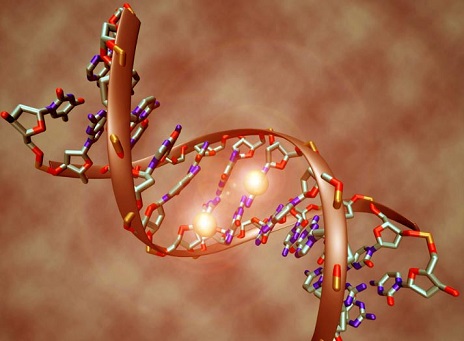Nikhil Prasad Fact checked by:Thailand Medical News Team Aug 22, 2024 1 year, 6 months, 5 days, 16 hours, 22 minutes ago
Medical News: Long-COVID’s Lingering Impact on Health - What Epigenetics Reveal
The long-term effects of COVID-19, particularly in the form of Long-COVID, continue to puzzle researchers worldwide. Even six months after recovery from the initial infection, individuals may still experience a range of symptoms that persist and significantly impact their daily lives. This
Medical News delves into the latest findings from a groundbreaking study that sheds light on the epigenetic changes linked to Long-COVID, providing new insights into how the virus may cause lasting damage to the body.
 Study finds that Long-COVID linked to accelerated aging and epigenetic changes
The Study and Its Significance
Study finds that Long-COVID linked to accelerated aging and epigenetic changes
The Study and Its Significance
Researchers from a coalition of institutions, including the IRCCS Istituto Auxologico Italiano, the University of Milan, and other prominent Italian research centers, have conducted an in-depth investigation into the epigenetic changes in patients who had recovered from COVID-19. The study explored and examined DNA methylation patterns - a key epigenetic mechanism - in 96 individuals six months post-COVID-19 infection. The researchers compared these patterns with those of 191 healthy controls, revealing significant differences that could explain some of the lingering symptoms of Long-COVID.
Epigenetics and COVID-19: The Basics
Epigenetics refers to changes in gene expression that do not involve alterations to the underlying DNA sequence. DNA methylation is one such epigenetic mechanism, where methyl groups are added to the DNA molecule, often affecting how genes are turned on or off. This study specifically looked at changes in DNA methylation across the genome to identify patterns that might be associated with COVID-19 and its long-term effects.
Key Findings: Accelerated Aging and Epigenetic Drift
One of the most striking findings of the study is the evidence of accelerated biological aging in individuals who had recovered from COVID-19. Using Horvath’s epigenetic clock, a well-known tool for estimating biological age based on DNA methylation patterns, the researchers observed a slight but statistically significant increase in age acceleration among the post-COVID-19 group. This suggests that the virus might have lasting impacts that make the body age faster than usual.
Additionally, the study found an increase in stochastic epigenetic mutations (SEMs) in the post-COVID-19 group. SEMs are random changes in DNA methylation that can accumulate over time and are often associated with aging and disease. The presence of more SEMs in the post-COVID-19 patients indicates that the virus may contribute to what scientists call "epigenetic drift"—the gradual accumulation of epigenetic changes that can disrupt normal cellular functions and lead to health issues.
Exploring the Affected Genes
The study identified 42 specific sites on the DNA where methylation patterns differed significantly between the post-COVID-19 patients and the healthy controls. These sites we
re located primarily in regions of the genome known as CpG islands, which are often found near gene promoters - regions of DNA that help regulate gene activity. Among the genes affected were several that play crucial roles in brain function, immune response, and metabolism.
One particularly notable gene is GLUD1, which is involved in glutamate metabolism. Glutamate is a critical neurotransmitter in the brain, and its dysregulation has been linked to neurological issues, which are common among Long-COVID patients. The hypermethylation of this gene in the study suggests that COVID-19 might lead to long-term changes in brain function, potentially explaining symptoms like brain fog and memory problems.
Another gene of interest is ATP1A3, which is essential for the proper functioning of nerve cells and has been linked to various neurological disorders. Its altered methylation pattern in post-COVID-19 patients could contribute to the neurological symptoms observed in Long-COVID.
Implications for Long-COVID Symptoms
The study’s findings provide a potential explanation for many of the symptoms associated with Long-COVID, including fatigue, cognitive difficulties, and cardiovascular issues. The epigenetic changes observed suggest that COVID-19 may not just be a transient infection but one that leaves a lasting imprint on the body’s biological systems.
For instance, the involvement of the VEGF signaling pathway, which is crucial for blood vessel formation and function, aligns with the cardiovascular complications seen in some Long-COVID patients. Similarly, disruptions in the TGF-β signaling pathway, associated with the gene SMAD2, could explain immune system irregularities and chronic inflammation in these individuals.
Conclusions: A Step Toward Understanding Long-COVID
This study represents a significant step forward in understanding the long-term effects of COVID-19. By highlighting the epigenetic changes that occur months after the initial infection, it opens up new avenues for research and potential treatments for Long-COVID. These findings underscore the importance of ongoing monitoring and care for individuals recovering from COVID-19, as the virus’s impact may be far more enduring than previously thought.
The research offers hope that by understanding the underlying mechanisms of Long-COVID, scientists may eventually develop targeted therapies to mitigate its effects. For now, it provides a crucial reminder of the seriousness of COVID-19 and the importance of taking precautions to prevent infection.
The study findings were published in the peer-reviewed journal: Clinical Epigenetics.
https://clinicalepigeneticsjournal.biomedcentral.com/articles/10.1186/s13148-024-01724-9
For the latest COVID-19 News, keep on logging to Thailand
Medical News.
Read Also:
https://www.thailandmedical.news/news/covid-19-accelerates-biological-aging
https://www.thailandmedical.news/news/mild-or-moderate-covid-19-causes-accelerated-brain-aging-especially-in-young-to-early-middle-aged-adults
https://www.thailandmedical.news/news/breaking-covid-19-news-israeli-and-american-study-shows-epigenetic-changes-occurring-with-elevated-a-to-i-rna-editing-in-covid-19-infected-individuals
